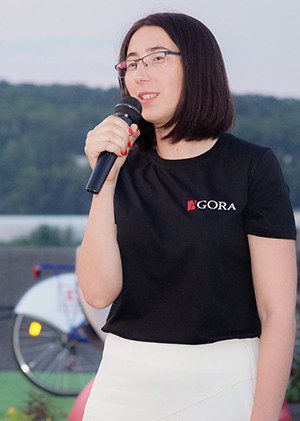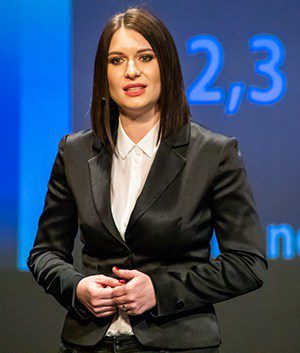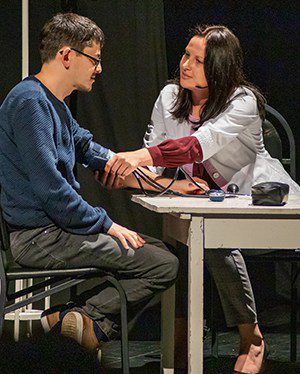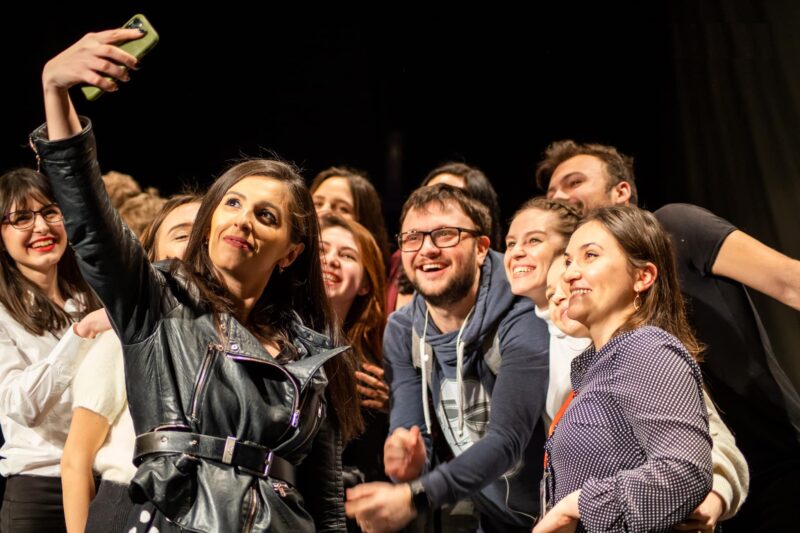In September 2017, the European Parliament issued a draft resolution expressing concern about the progress of democracy in Moldova, highlighting the persistent issues of corruption and political pressure on media. The EU specifically identified the concentration of the Moldovan media in the hands of a few major players as a “threat to political pluralism.”
One Independent Media Outlet Struggles to Survive

In 2017, Irina Ghelbur was taking her first steps as the managing director of Agora, a prominent independent news outlet in Moldova. She was faced with one of the most challenging tasks of her life: coordinating a media outlet and keeping it afloat.
“In my first month of being ‘the boss,’ I was paying salaries from one last grant and starting April 2017 with nearly empty bank accounts,” Ghelbur said. “For the second month, I was desperately trying to figure out what to do. The money wasn’t coming from anywhere, but people were still working and doing professional journalism.”
Developing a Strategy for Sustainability
Later in 2017, Internews’ project Media-M in Moldova selected Agora and five other media outlets to receive long-term mentoring and grant support focused on developing strategic planning tools, increasing advertising revenues, and creating new sources of revenue such as events and subscriptions, to cover all expenses related to the creation and distribution of content.

With Media-M’s support, Agora was able to expand its team and broaden its scope beyond that of simply a news website. Its audience reach has increased by close to one million.
“I think this is the main element that sets us apart from others, although news has been and will remain a basic pillar of our activity,” said Victoria Dumbrava, Agora’s Editor-in-chief. “We want to be part of the community through the communication platform we provide. We want people to be able to interact through Agora and establish partnerships, and the business environment to communicate with government institutions (and vice versa).”
Agora Engages with the Local Community
In early 2020, Agora’s new Social Media Manager began to develop and implement a new daily newsletter, “News Portion,” which gained approximately 2,500 subscribers in the first three months.
Agora also began organizing networking events not only to monetize its content, but to create a community. Before COVID-19 restrictions were introduced, Agora had organized over 20 events, including five events in its ROOFOFFLINE series, which raised close to 5000 euros.
Agora has become one of the most credible and popular media institutions in the Republic of Moldova by ensuring the quality and diversity of its content. The most recent report by BATI, the Internet Audit Office, ranks Agora among the top ten online resources of this type in Moldova in terms of user figures and reach.
Agora Learns to Adapt to the COVID-19 Pandemic
At the beginning of March 2020, Agora faced a new, unprecedented challenge: adapting to work under the conditions of the COVID-19 pandemic with limited access to information, an altered newsroom workflow, and reduced field work, as well as the indefinite nature of these changes.

Coincidentally, in 2019 Agora reporter Irina Soltan had decided to radically change her life and exchange a medical office and patient records for a newsroom and a health news beat.
“The first inkling that I would like to do journalism came five years ago when I was already working as a medical assistant.” Soltan said.
“I understood that I like to communicate with people, that I can explain things or find answers to what is bothering me or others. And most of all, I understood that there is a very powerful drug: the word.”
Soltan and her team members are working to get information about COVID-19 out to the public. Due to the rise in demand for news during the crisis, Agora’s website readership has grown by approximately 80%.
Launching a Subscription Model to Make up Lost Ad Revenue
To survive the decline in advertising revenue caused by the pandemic, Agora took a major risk and launched a membership system. Agora does not have a paywall, and the website and its content remain free for everyone, however subscriptions give members features and perks such as discounts and tickets for events, a closed Facebook group, and ad-free website access.
The membership system earned Agora revenues that equated to 30% of the salary costs for the Agora editorial office.
Member Ana Trifan praised the new business model. “In difficult times for all, these people [at Agora] have chosen to act instead of complaining. They want to write guided by the interest and expectations of the reader, who will pay their salary if they are satisfied with the content generated by the team. The decision to support them is a way of saying thank you for the fact that, in the morning, I can enter their platform and be sure that I will find information to which it is worth dedicating my time.”
Agora Plans to Become Self Sustainable
Agora had its first-ever net positive cash balance in 2018, with a 45% increase in revenue compared to the previous year. Over the course of 2019, revenue increased by 97%.
“We have a clear strategy and ambitious plans. We are going through months when the bank account looks bleak and we are not sure that by the end of the month it will look better, but we are not cutting any ambitious plans from the list and are not changing the speed of action,” said Ghelbur.
“As long as the public reads us, we will have the validation that we are doing the right thing and will find the resources to keep our business going. We want to become a platform primarily supported by subscribers with minimal dependence on grants.”
Internews’ project in Moldova – “Media Enabling Democracy, Inclusion and Accountability in Moldova” (Media-M) – is funded by USAID and UKaid with additional support from SIDA.
(Banner photo: The Agora team. Credit Agora)
